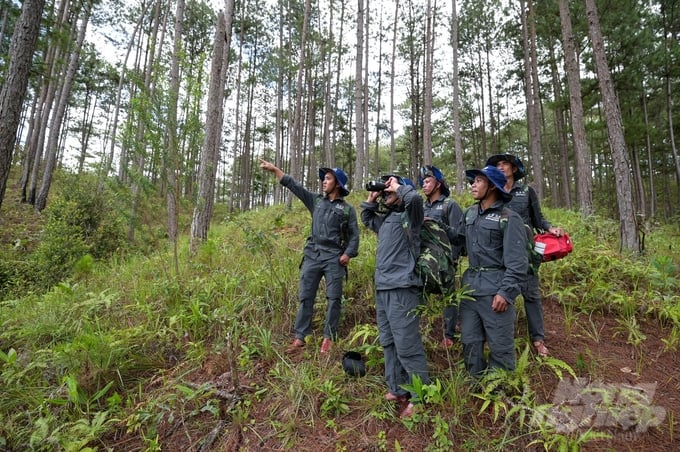November 28, 2025 | 04:52 GMT +7
November 28, 2025 | 04:52 GMT +7
Hotline: 0913.378.918
November 28, 2025 | 04:52 GMT +7
Hotline: 0913.378.918

The theme for International Day of Forests 2024 is Forests and Innovation: New Solutions for a Better World.
Forests are a stabilizing force for life on this planet.
Covering around one-third of all land on Earth, they regulate ecosystems, protect biodiversity, support livelihoods in rural communities and can help drive sustainable development.
Forests are also home to most of earth’s terrestrial biodiversity. They supply water, provide livelihoods, mitigate climate change and are essential for sustainable food production.
Yet deforestation and forest degradation continue to take place at alarming rates. We must take bold actions to reverse the loss of forests and their biodiversity for the benefit of current and future generations. This is a call to action for every individual and country, including Viet Nam.
To underline the need for action, this year’s theme for International Day of Forests 2024 is Forests and Innovation: New Solutions for a Better World. The importance of forests to our future is why the United Nations General Assembly, in 2012, proclaimed 21 March as the International Day of Forests to celebrate and raise awareness of the importance of this renewable resource.
This year’s theme is highly relevant to us all. Though the rate of deforestation has decreased over the past three decades, more than 420 million hectares of forest have vanished globally since 1990. With 10 million hectares lost annually due to deforestation and approximately 70 million hectares affected by fires, the battle against deforestation requires new technological advancements. These innovations are essential for early warning systems, sustainable commodity production, and empowering people through land mapping and climate finance access.
In simple terms, reducing deforestation and forest degradation, in step with restoring and sustainably managing forests, are critical pathways to help achieve the 2030 Sustainable Development Goals.
That is why the Food and Agriculture Organization (FAO) is a committed partner of Viet Nam, in particular the Ministry of Agriculture and Rural Development, to embed a range of innovative technologies into the country’s forestry sector. This includes establishing a monitoring and evaluation system for forest resources, with the application of remote sensing technology, geographic information systems, information technology in forestry industry management, mapping and securing customary land. These efforts will help empower local rural communities and ethnic minorities. By 2030, this work by FAO and local partners will see 100 percent of forest owner organizations capable of monitoring, supervising, managing forest resources, and preventing and fighting forest fires based on science and technology.
FAO is also helping Viet Nam tune into the digital transformation revolution by diversifying revenue sources from forests, such as carbon credit transactions through the upcoming FAO-backed lowering missions by accelerating forest finance (LEAF) Reduction Programme, plus technical support of the Payment for Forest Environmental Services initiative. With Viet Nam one of the world’s largest wood and wood product exporters, ranking fifth globally and first in Southeast Asia, FAO is helping push the boundaries of sustainable wood products. Additionally, through ecosystem restoration, including reforestation efforts, we are boosting climate mitigation efforts and enhance food security in vulnerable communities.
These innovations taking root in Viet Nam’s forestry sector are inspiring and set a solid foundation for further initiatives to ensure this critical renewable resource is able to continuing replenishing itself and remain a force for life on this planet.
In the words of FAO Director-General Dr QU Dongyu, “let us build a green, healthy and resilient future with forests, for all-live in a city with forests and in a village surrounded by forests”.
FAO Representative in Vietnam

(VAN) On November 27, in the meeting with Minister Tran Duc Thang, Mayor Yin Yong shared Beijing’s experience to improve environment and air quality.

(VAN) After 30 years, both sides identified strategic areas of cooperation: sustainable production, increasing coffee value and training for farmers.
/2025/11/27/4910-4-164708_294.jpg)
(VAN) On the afternoon of November 27 in Beijing, Minister of Agriculture and Environment Tran Duc Thang held a working session with several major Chinese enterprises operating in the agriculture and environment sector.

(VAN) The Department of Animal Health issued a provisional guideline requesting local authorities to increase surveillance, collect samples for testing, and conduct epidemiological investigations according to the established procedure.

(VAN) The United Nations recommends that Vietnam utilize data and artificial intelligence to enhance early disaster warnings and reduce GDP losses by 3.2% in the context of climate change.

(VAN) On the morning of November 27 in Beijing, Minister Tran Duc Thang and the Deputy Commissioner General of the General Administration of Customs of China signed a protocol on fresh jackfruit exports.

(VAN) As floodwaters recede, a vast network of irrigation works across eastern Gia Lai is emerging in a state of severe disrepair, with extensive damage demanding urgent restoration ahead of the 2025-2026 winter-spring cropping season.